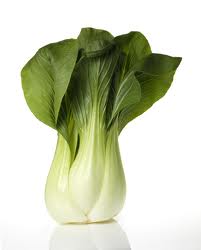 Bok Choy, also known as pak choi, is the most common type of Asian cabbage. With white stems and dark green leaves, this Asian vegetable is a great addition to soup, as stir fry or simply steamed. Originating in China, this simple and delicious leafy vegetable has been known to be part of Chinese cuisine for more than 6,000 years. Praised in poetry and ancient culinary texts, bok choy has been consumed for its ability to battle fever, inflammation, infections and the occasional sore throat. Bok choy was introduced to European cuisine in the 18th century, where it quickly became known for its taste and medicinal qualities. Today, there are over 20 varieties of bok choy to satisfy your palate.
Bok Choy, also known as pak choi, is the most common type of Asian cabbage. With white stems and dark green leaves, this Asian vegetable is a great addition to soup, as stir fry or simply steamed. Originating in China, this simple and delicious leafy vegetable has been known to be part of Chinese cuisine for more than 6,000 years. Praised in poetry and ancient culinary texts, bok choy has been consumed for its ability to battle fever, inflammation, infections and the occasional sore throat. Bok choy was introduced to European cuisine in the 18th century, where it quickly became known for its taste and medicinal qualities. Today, there are over 20 varieties of bok choy to satisfy your palate.
Key Nutrients
Bok Choy is an excellent source of vitamin A, vitamin C, folic acid, potassium, calcium, biotin and magnesium. Bok choy is also a great source of dietary fiber and beta carotene.
Health Benefits
Bok choy is a very good source of beta carotene. Beta carotene has been well-studied as a dietary antioxidant. Carotenoids are also thought to benefit eye health. Some studies support a role of carotenoids in reducing macular degeneration.
Regular consumption of foods rich in vitamin C helps body develop resistance against infectious agents and scavenge harmful, pro-inflammatory free radicals.
Vitamin B12 – Vitamin B12, or folic acid, helps to preserve neurological function and DNA synthesis. It also plays a key role in the health of red blood cells. The nervous system relies on vitamin B12 for proper function as well.
Vitamin A – Vitamin A, when converted into retinaldehyde, is a vital compound for healthy eyes. Furthermore, vitamin A is believed to fight against cataracts, macular degeneration and glaucoma. Vitamin A strengthens the membranes of the human body such as mucous membranes, respiratory, urinary and intestinal tracts. It is also essential for the lymphocytes, or white blood cells, that fight infection once in the body.
Vitamin C – Regular consumption of foods rich in vitamin C helps the body develop resistance against infections and scavenges harmful, pro-inflammatory free radicals. Vitamin C also helps to prevent respiratory problems such as asthma and lung cancer. Vitamin C has been shown to lower blood pressure, and therefore lessen the probability of hypertension.
Potassium – Potassium is an essential mineral which aids in fluid regulation, protein synthesis and cardiovascular health. High levels of potassium are associated with reduced risk for stroke, improved blood pressure control as well as bone health.
Calcium – Calcium is an important mineral for bone and teeth growth and maintenance. It is also an important mineral in terms of cardiovascular function.
Magnesium – Magnesium helps to keep muscle and nerve tissues functioning normal, as well as promotes a proper heartbeat. It also assists in the support of a healthy immune system and keeps bones strong.
Season
Bok Choy is grown from spring time through the fall. Large commercial operations grow this Asian cabbage in greenhouses as well, making it available year round in most supermarkets.
Nutrition Information
Per 1 cup (70 grams):
Calories (cKal): 9
Protein (grams): 1.05
Total Fat (grams): .14
Carbohydrates (grams): 1.53
Fiber (grams): .7
Buying and Storing
When buying bok choy, make sure the leaves and stems are not discolored or damaged. Once purchased, you can keep this Asian cabbage in your refrigerator for up to one week.
Best Way to Add to Diet
Bok Choy tastes great steamed in boiling water. Additionally, you can chop this leaf vegetable and add it to a stir fry or soup.
Bok Choy Recipe
Bok Choy with Spicy Garlic Sauce

 Not Sure What Healthy Foods To Eat?
Not Sure What Healthy Foods To Eat? This week we take a look at one of my favorite healthy foods...the mighty Avocado.
This week we take a look at one of my favorite healthy foods...the mighty Avocado.
No comments yet.